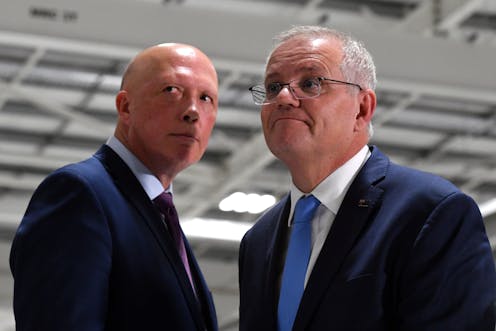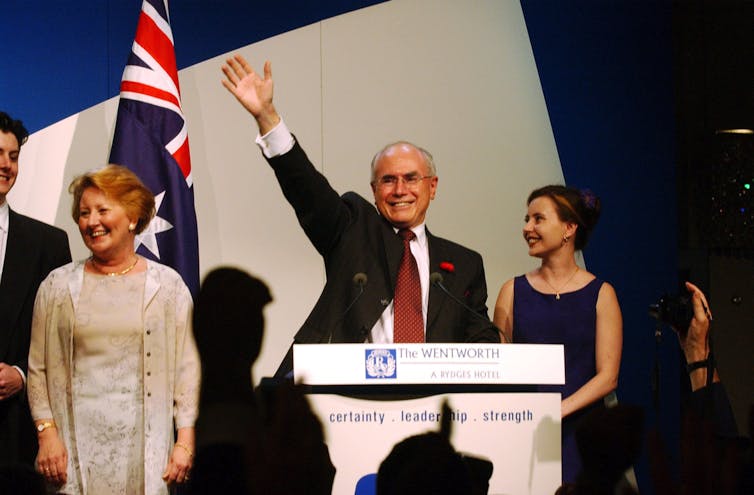
Elections held in the shadow of war or overarching national security concerns tend to favour incumbents.
In the three elections since the second world war that have been directly affected by security worries, incumbent governments have prevailed.
In 1951, Robert Menzies fought an election on his determination to ban the Communist party. This was an effort to wedge the Labor party on divisions within its own ranks between a Soviet Union-sympathetic left and an anti-communist right.
Menzies’ election speech of April 28, 1951, delivered in his own electorate of Kooyong, makes interesting reading in light of debates now about surging Chinese influence in the region. He said:
I need not tell you that every way the Communists are delighted with the Labor Opposition.
This speech was delivered against the backdrop of the Korean war, in which Mao Zedong’s forces fought on the side of North Korea and against Australian soldiers defending the south.
Menzies’ Coalition went on to win the election against Ben Chifley’s Labor Party. While the Coalition lost five seats, it was a status quo result in the 121-member House of Representatives, with the Liberal and Country parties maintaining a comfortable majority 69-52. Labor lost control of the Senate.
Menzies subsequently failed to ban the Communist Party at a referendum.

In 1966, Harold Holt, as newly-anointed leader of the Liberal Party and prime minister, won a landslide victory against Arthur Calwell’s Labor largely on the issue of Australia’s commitment to Vietnam.
This was a popular cause at a time of significant community concern about communist influence in the region accompanied by the spectre of dominos falling towards Australia.
Calwell, who had given one of the great parliamentary speeches in 1965 in which he opposed Australia’s commitment to Vietnam, presided over a catastrophic loss for Labor. It was reduced to 41 seats in the 124-member House of Representatives against the Coalition’s 82, with one independent.
Read more: Issues that swung elections: Labor's anti-war message falls flat in landslide loss in 1966
In the third example of incumbency proving to be an important element in an election victory, John Howard in 2001 parlayed anxiety about boat arrivals and a terrorist attack on American soil to propel him to victory.
The Coalition had been faltering in the polls.
Howard’s win over Kim Beazley’s Labor in the shadow of the commitment of Australian troops to Afghanistan to root out al Qaeda underscored the advantages of tenure in uncertain times.
The Tampa episode on the eve of the 2001 poll, in which a Norwegian vessel with stranded boat people on board was refused entry to Australia, prompted one of the more telling interventions in an Australian political debate. Howard responded with:
We will decide who comes to this country and the circumstances in which they come.

This brings us to the election of 2022 in which Prime Minister Scott Morrison and Defence Minister Peter Dutton are seeking to use legitimate concerns about a Chinese presence in the Pacific as election fodder.
The Solomon Islands security pact with China has provided a pretext for wedge-politics electioneering, aimed at Labor.
In remarks on Anzac Day, Dutton returned a familiar theme in which he likened China’s rise to that of Third Reich in Nazi Germany, and compared Russian President Vladimir Putin with Adolf Hitler in his efforts to subjugate Ukraine.
We’re in a period very similar to the 1930s. And I think there are a lot of people in the 1930s that wish they would have spoken up much earlier in the decade.
In his own efforts to exploit security concerns arising from China’s growing presence in the Pacific, Morrison warned of a “red line” should Beijing seek to establish base facilities in the Solomon Islands.
With its long history of having paid the price politically on national security, Labor has been skittish on the China issue in its efforts to minimise differences with the government.
Morrison and Dutton have sought to make capital out of Labor’s attempts to argue for a more constructive relationship with Beijing. This has caused discomfort among Labor frontbenchers, notably its deputy leader Richard Marles.
In a speech to Beijing’s Foreign Studies University in September 2019, Marles described talk of a new Cold War as “silly and ignorant”. He went on to say, “to define China as an enemy is a profound mistake”.
These words have been seized on by the government and its friends in the media to portray Marles, who may well become defence minister in an Albanese government, as “soft” on China.
Marles has pushed back against these slurs, but it is unlikely he would deliver a similar speech today given China’s further encroachment into the region.
His Beijing speech is absent from his website.
In his efforts to exert pressure on his opponent over Labor’s more nuanced approach to China, Morrison used a peoples’ forum debate to claim Anthony Albanese had taken “China’s side” in debates over the pandemic and border closures.
Albanese responded “that’s an outrageous slur by the prime minister”.
This matters because if a Coalition is re-elected, the prospects of an improvement in relations with China would remain poor. Morrison’s and Dutton’s interventions have hardened the edges of Australia’s relationship with its largest trading partner.
All this is a very long way from the agreement between then Prime Minister Tony Abbott and visiting Chinese President Xi Jinping in Canberra in 2014, to upgrade relations to a “comprehensive strategic partnership”.
Beijing’s mouthpiece, the Global Times, commented:
When Morrison made the ‘red line’ statement, he jeopardised the red line of the Solomon Islands, an independent country, by failing to recognise the latter’s diplomatic sovereignty.
This year, unlike 1951, 1966 and 2001, Australians are going to the polls not when lives might be lost in foreign conflicts, but at a time when voter concerns are domestically-focused.
A “True Issues” survey by JWS Research in the Australian Financail Review in March found that cost of living and healthcare trumped concerns about defence, security and terrorism.
An ABC Compass poll this month found that climate change was top of mind, followed by cost of living and affordability. Defence and public security rated a lowly eighth in the ABC poll, as it did in the JWS Research poll.
In other words, there is no clear indication a “China threat” will prove significant in an election dominated by bread and butter issues.
Tony Walker is a member of The Conversation board.
This article was originally published on The Conversation. Read the original article.







